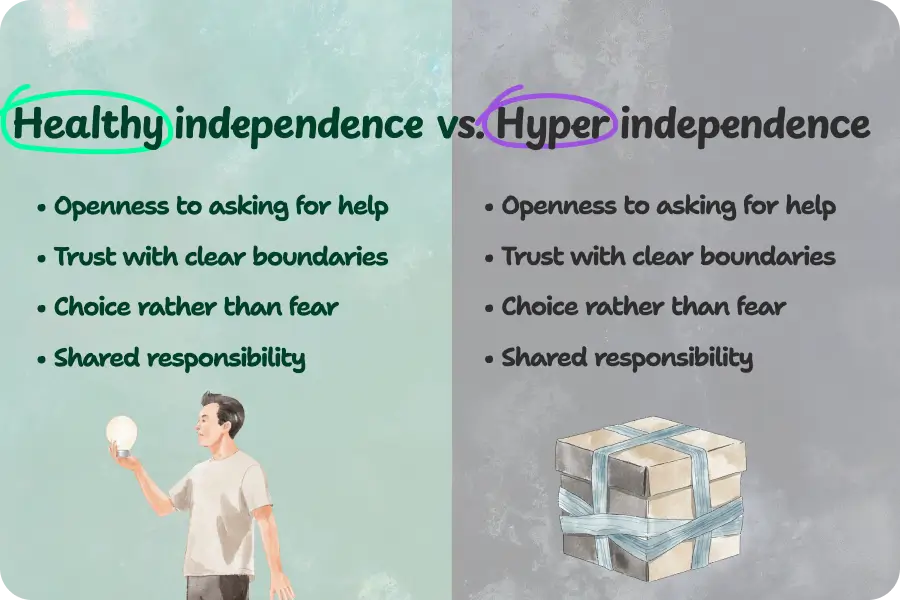You do everything on your own, never trust other people on important tasks, and believe that if you show your vulnerable side, others will take advantage of you. While all these behaviors may seem like confidence or self-sufficiency, these are signs of hyper-independence.
Read the article to discover why it can be a trauma response, how this approach to life influences your communication with others, and what to do if you want to build healthy relationships.
What is hyper-independence?
Hyper-independence is an extreme form of self-reliance when a person completely avoids reaching out for support even when they need help. A few common signs of hyper-independence include:
- Overachieving
- Feeling ashamed to ask for help
- Emotional unavailability
- Trust challenges
This behavior can stem from past trauma responses and lead to a person’s emotional isolation. People who experienced emotional neglect or betrayal may live with feelings of loneliness and self-criticism and even develop anxiety or depression.
6 signs of hyper-independence
Overly independent people may try to do everything on their own. Here are the most common behaviors you should be aware of.
1. Refusing to delegate tasks or ask for help
Hyper-independent people may not want to reach out for help, even when it’s hard for them to do things on their own. [1] They may feel like they’re losing control if the task doesn’t involve relying solely on themselves.
Accepting help can seem like taking out a loan that they’ll eventually have to pay back. It may also feel like admitting they aren’t “good enough” at the task. So, hyper-independent people would rather work hard in private than risk looking incapable in front of someone else.
2. Feeling ashamed when you need to rely on others
For someone who experiences hyper-independence symptoms, it may be uncomfortable if they finally have to ask for help. They might feel anxious, guilty, or weak, and sometimes even frustrated with themselves for “not being able to handle it alone.”
Other common feelings include:
- Resentment toward those offering help
- Fear of judgement
- Pressure to prove their competence at all costs
Imagine a bride and groom planning their ideal marriage. At first, everything went smoothly, but then the couple realized they still needed help with organization, so they hired a wedding planner. Even though it’s the right choice, the bride felt defeated. For a hyper-independent woman, needing support was more like a personal setback.
3. Mistrust of others
One more sign of toxic independence is believing others will let you down. “Consciously or unconsciously, they’d do everything wrong and betray my trust.” This is how some people may think without even noticing it.
Sharing secrets with others, accepting help, or discussing your worries or plans connected to personal projects feels impossible. It’d be easier to do it yourself than to risk mistakes from others. Even simple teamwork can feel like a gamble you don’t want to take.

4. Little or no close relationships
Hyper-independent people may seem like lonely wolves. Since they are often too cautious or distrustful of others, they can’t let their walls down, so it’s easier for them to avoid close relationships.
If you’ve seen Netflix’s The Queen’s Gambit, you probably remember the main character, Beth Harmon. While being overly independent, Beth often keeps people at arm’s length and refuses help.
5. Difficulty being vulnerable
Emotional unavailability and sticking to surface-level topics are also signs of hyper-independent behaviors. Such people can avoid sharing emotions, as it feels too risky. Being overly independent becomes a defense mechanism that may keep people feeling safe, but it often comes at the cost of true connection.
6. Overachieving and perfectionism
The core belief of hyper-independent people is “Everything needs to be perfect.” They can’t rely on others and can’t allow themselves to make mistakes. The pressure to always be “on point” may lead to:
- Constant stress
- Leaving little room for growth or self-compassion
- Worrying thoughts
- Procrastination and feeling overwhelmed
How hyper-independence affects daily life
Being too independent means that a person refuses to accept help and goes through tough times alone. Asking for support feels like a weakness, even though everyone sometimes needs emotional connection and assistance.
This defense mechanism may have helped earlier in life. However, it can keep a person from opening up to new experiences and building intimate relationships.
1. In romantic relationships
Building meaningful relationships with a hyper-independent person can be challenging. There’s nothing wrong with partners who solve their problems and can say, “I’m going to spend this weekend with my friends.” Yet, it can turn into a problem when your loved one constantly stays emotionally distant and doesn’t want to open up.
It can be challenging to discuss worries, set common goals, decide on responsibilities, and share the “mental load” of the future. When one partner takes on everything alone, it can lead to frustration.
“I love a hyper-independent person. How can I help them open up?” Hannah Schlueter, MA, LAC, comments, “One of the best ways to help a hyper-independent partner open up is to ensure you are actively listening and validating their experience. Especially in the presence of conflict, having foundational skills to make your partner feel heard and valued is going to help them continue to feel safe enough to share.”
2. At work
Hyper-independent people can be high achievers who face challenges with teamwork. They may do everything on their own and perfectly manage their personal tasks, like writing code or creating presentations. Yet, when it comes to collaboration, building interpersonal relationships with colleagues may be frustrating. Such people can:
- Do too much on their own.
- Keep work to themselves and make communication hard.
- Have trouble trusting others’ ideas or decisions.
- Prefer working alone, which can isolate them from the team.
- Experience burnout from handling everything by themselves.
- Ignore feedback.
Think about coworkers who have so much to do that they can barely handle it. They might work all night and drink five cups of coffee every day. However, they wouldn’t assign tasks to someone else, even if it meant working all weekend. These are perfect examples of hyper-independent behaviors.
3. On mental health
Hyper-independence symptoms can lead to anxiety, worrying about everything, attachment avoidance, and depressive symptoms. [2] Also, if overworking for too long, the strain of hyper-independence can manifest as burnout, where even the simplest tasks feel difficult to cope with.
So, if you find yourself in this never-ending rush and notice the first signs of survival mode, it might be time to reach out to a mental health professional.
What causes hyper-independence?
Hyper-independence isn’t a mental health condition. It’s a response that stems from past experiences, in particular:
- Childhood trauma. Neglect and emotional abuse can make a person believe that it’s better to handle all the challenges on their own and avoid communication with others.
- Previous betrayals and abuse in relationships. Living with a narcissistic or toxic partner can lead to mental health challenges. People may develop an insecure attachment style or completely avoid intimacy in the future.
- Social influences or growing up in a family that values hyper-independence. If you grew up in a country where society valued self-sufficiency and independence, this might have taught you that asking for help was bad, and you took this belief further in life.
- Low self-esteem. “I will do everything on my own” may stem from an intense fear that others may criticize or see you as incapable.
- Coping with loss of control in some areas of life. If you’ve recently lost a job or experienced a painful breakup, you may try to regain a sense of control by being overly self-sufficient in other spheres.
- Mental health issues. Hyper-independence might be a sign of post-traumatic stress disorder (PTSD), triggered by childhood trauma. [3]

Hidden connection between hyper-independence and trauma
Hyper-independence patterns may be stress responses linked to past trauma. Here’s how it works:
Childhood trauma
Adverse childhood experiences (ACEs) are a common reason why people become hyper-independent. If you grew up seeing that there’s no one here to give a helping hand, self-reliance becomes your typical reaction. It’s a coping mechanism that allowed a kid to cover emotional and physical needs in childhood, and now it continues to shape their adult life.
1. Parentification trauma
When you were a kid, needing to play the role of a parent can be parentification. You might have taken care of younger siblings, cooked for the whole family all the time, managed the budget, or talked about adult issues.
As a result, you could have gained a belief that you can’t rely on others, which made you develop hyper-independence.
2. Middle child syndrome
If your siblings have overshadowed you all the time, extreme self-reliance can be a trauma response. Growing up feeling “invisible” as a middle child could have taught you to lean only on yourself. This might have built a fierce independence that may push others away.
Explore yourself with Breeze’s self-discovery tests. Find out why you may be hyper-independent while tracking your emotions and how they can influence your daily behavior.
3. Betrayal trauma
When someone you trusted in childhood betrays you, it can turn into emotional baggage that you take further in life. There’s a chance that a person won’t believe others after this traumatizing experience. It can transform into an inability to share secrets, lean on important tasks, or a general desire to cope with everything alone.
4. Emotional neglect
One more case when not asking for help is a trauma response after a person was neglected. Pretty much like with middle child syndrome, in tough times, you could have felt lonely.
This feeling, “I’m unimportant, and no one cares about me,” can take root, making it feel safer to rely only on yourself. It builds a wall around you, keeping others at bay and making it harder to let people in, even when you need support.
Later traumatizing experiences that lead to extreme independence
ACEs aren’t the only possible traumatic experiences that may transform into toxic independence. People may develop it later in life due to:
- Abusive relationships
- Painful breakup
- Grief and loss
- Major life changes
- Negative treatment at work
- Career setbacks, etc.
Think about Iron Man, aka Tony Stark, from the Marvel movies. After being kidnapped and witnessing the destructive power of his weapons, Tony’s world is shaken. His hyper-independence, rooted in the trauma of betrayal and guilt, drove him to shoulder immense responsibilities alone.
How to develop healthy independence and overcome unhelpful coping mechanisms
To relieve trauma symptoms and learn to seek support comfortably, you may need to approach habitual thoughts and behaviors from a different perspective. Here’s how to do it:
1. Identify “the cost” of doing it alone
You may not think about this while doing plenty of tasks alone, but consider the influence on your mental and physical health that lack of rest may have. Maybe hyper-independence makes you sleep less than 6-8 hours, miss meals, or ignore other basic needs or signs of exhaustion. Also, you might miss friendly gatherings and feel emotionally disconnected or lonely, even when surrounded by people.
Write down the positive and negative aspects of hyper-independence. This retrospective will motivate you to work on building trustful and healthy relationships with others.
2. Reframe your thoughts
Since excessive independence can be a trauma response, you may use this CBT technique to challenge automatic beliefs. This is how to do it:
- Spot one belief and write it down. For instance, it can be “I can only rely on myself.”
- Think about proofs. Maybe other people do everything incorrectly, or you’ve had negative experiences in the past.
- Next, look for evidence against this belief. Maybe your colleague does some tasks perfectly, or you have a professional manager who’s ready to support you.
- Once you see that overgeneralization isn’t helpful, reframe the belief. You can write something like, “I can take care of myself and still choose safe people to rely on.”
- Follow the same steps with other thoughts that may negatively influence your well-being.
3. Practice “micro-requests”
When you only learn healthy coping mechanisms, it can be challenging to rely on others from the very beginning. This is where small requests may be helpful. Don’t focus on something big. You can start by asking:
- Your family members to wash the dishes
- A colleague to proofread one page
- A friend to listen for five minutes
- A teammate to handle one small task
- A loved one to remind you about a deadline
4. Learn to delegate correctly
It can seem challenging to entrust the whole task at once. So you may also begin with small parts of a task, clearly explaining expectations and deadlines. If it happens at work, you can check in with a coworker from time to time and discuss progress. If you delegate something to your partner, agree in advance on what “done” looks like and resist the urge to take the task back.
Here are some additional tips that may be effective:
- Delegate outcomes, not every step, so the other person has room to work independently.
- Set expectations, deadlines, and boundaries before the task begins.
- Accept “done well” instead of waiting for “done perfectly.”
- Limit check-ins to agreed moments to avoid micromanaging.
- Start with low-risk tasks to build trust gradually.
5. Communicate your capacity early
If you find yourself completely burned out, it signals that you have waited too long to let others in. But you don’t need to wait until complete exhaustion to ask for help. And here’s how to spot this need faster:
- The “yellow light” rule. Talk to others when you are at 60% or 70% capacity rather than waiting for 100%. You can say, “I have too much to do,” to give people a chance to help you.
- Share the reason, not just the cause. Instead of just saying you’re busy, you can share a bit of the mental load. For instance, tell a partner, “I feel a little overwhelmed by this project,” to help them understand your internal state without you having to “surrender” your independence.
6. Reach out for professional help
Sometimes, the trauma response may be so strong that it can be challenging for a person to overcome it on their own. In this case, a licensed therapist can provide emotional support and teach you how to stop being excessively self-reliant. Treatment approaches may include:
- Cognitive behavioral therapy (CBT) helps identify and challenge beliefs related to developmental trauma.
- Eye movement desensitization therapy (EMDR) allows the nervous system to feel safe trusting others again.
- Somatic therapy teaches a person to recognize the physical “tightening” or anxiety that happens when someone offers support.
- Interpersonal skills training is good for practicing “micro-vulnerabilities,” such as delegating small tasks or expressing needs before a crisis occurs.
Expert Insight
“The most common approach for treatment of hyper-independence is to work on a person’s attachment style. This will help them learn to feel safer in their relationships and allow them to find opportunities to ask for help, find support, and share their vulnerability in more adaptive ways. The second approach would be through Cognitive Behavioral Therapy (CBT), as it would help a person adjust their beliefs that perpetuate their extreme self-reliance and create a more flexible and balanced relationship with asking for help and trusting other people.”
Hannah Schlueter
Mental health professional
Frequently asked questions
Is being a hyper-independent person bad?
Being independent in a healthy way is great, as you can handle life challenges and tackle obstacles head-on. However, when extreme self-reliance is holding you back and harming your life and happiness, it’s time to get alarmed.
Hyper-independent tendencies can lead to:
- Emotional isolation
- Burnout from taking on too much alone
- Chronic stress
- Problems with communication
- Feeling unsupported
- Reduced satisfaction in work and personal life
What are the benefits of being hyperindependent?
If you are in a toxic environment, hyperindependence can protect you. Whether working in a position where you feel unsupported or staying in abusive relationships, being extremely independent can serve as a shield.
How does hyper-independence treatment happen?
Treatment for hyper-independence focuses on moving from a “survival mode” of total self-reliance to a healthy state of interdependence. Typically, mental health professionals do this by working with a person’s attachment style and applying CBT strategies to reframe unhelpful thoughts. They may also turn to EMDR, somatic therapy, and interpersonal skills training to overcome unhelpful patterns of hyper-independence.
Sources
- Ishikawa A, Rickwood D, Bariola E, Bhullar N. “Autonomy versus support: self-reliance and help-seeking for mental health problems in young people.” Soc Psychiatry Psychiatr Epidemiol. 2023
- Pal, Shruti & Hasan, Zuby. (2025). “Emotional Exile: Unpacking Hyper-Independence, Attachment Avoidance, and the Role of Internalized Shame in Young Adults.” International Journal of Interdisciplinary Approaches in Psychology (IJIAP)
- Dr. Leenah Askaree, Kanza Safdar, Juwairiah Fraooqui, Hurmat Umar, Rubab Jan Panhwar, Lareb Kareem Baloch. “Investigating the Relationship between Childhood Trauma and Hyper-Independence among University Students: From Adversity to Self-Reliance.” Research Journal of Psychology (RJP). 2025
Disclaimer
This article is for general informative and self-discovery purposes only. It should not replace expert guidance from professionals.
Any action you take in response to the information in this article, whether directly or indirectly, is solely your responsibility and is done at your own risk. Breeze content team and its mental health experts disclaim any liability, loss, or risk, personal, professional, or otherwise, which may result from the use and/or application of any content.
Always consult your doctor or other certified health practitioner with any medical questions or concerns
Breeze articles exclusively cite trusted sources, such as academic research institutions and medical associations, including research and studies from PubMed, ResearchGate, or similar databases. Examine our subject-matter editors and editorial process to see how we verify facts and maintain the accuracy, reliability, and trustworthiness of our material.
Was this article helpful?








